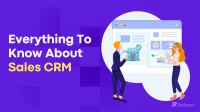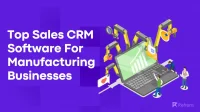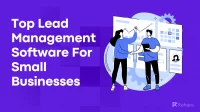In today’s fast-paced business environment, managing leads effectively is crucial for any company’s success.
With the rise of technology, businesses have access to a wide range of lead management software that can help streamline their processes and increase their productivity.
However, with so many options available, it can be overwhelming to choose the right one for your business. In this blog, we will take a closer look at the top lead management software in 2023, broken down by industry, to help you make an informed decision.
Whether you are in real estate, small business, freelancing, or any other industry that requires lead management, this blog will provide you with valuable insights into the best lead management solutions available to help you grow your business.
Factors You Need to Consider Before Choosing a Lead Management Software
To ensure that you are choosing the right LMS for your business, consider the following factors:
1. Identify your business goals and objectives
The first thing you need to do is to understand your existing sales process step-by-step, see all the bottlenecks in your current process, and list down all your business goals and objectives you need to fulfill.
This will help you determine the features and capabilities you would need in a lead management system. Also, try to find a lead management system that has a proven track record of success in businesses of a similar size and industry to yours.
2. Adaptability & User-friendliness
Choose an LMS that is easy to use & learn, and offers onboarding training & support if and when needed. Also, check if it lets you customize the features according to your existing sales process.
For example, Refrens allows you to create multiple sales pipelines for different products and services, and customize things like lead stages, pipeline fields, tags, etc
3. Integration & Automation capabilities
Check if the LMS can integrate with other tools & software if required. For example, Refrens has these embedded web forms which you can embed on your website & other platforms where you get your leads.
Any leads collected via these forms will automatically reflect in your LMS.
4. Scalability
See if the LMS can handle your growing business needs. Check whether it can support a large number of leads and users.
5. Reputation & Security
Make sure that you are going with an LMS that is secure, is reputed, and has a track record of success in businesses of a similar size and industry to yours.
6. Budget
Last but not least, consider the cost of the LMS. Understand the pricing mechanism. See if you will be charged on the basis of the number of leads you manage, the number of team members using the system, or the number of features you use.
See if the pricing mechanism makes sense according to your budget and requirements.
Let’s take a look at the best software solutions that can help you organize and manage your leads, as well as automate and streamline your sales process.
Best lead management software for small businesses
If you are a small business owner, you probably started managing your leads in a spreadsheet. And it works well for a certain scale.
But once your team size increases and you start getting more leads, it becomes difficult to keep track of all your leads. Switching to lead management software can help you bring efficiency to your lead management process.
When you go looking for lead management software for your small business, you are surely going to get confused by having to choose from 100s of software out there.
This is especially a problem because your needs are going to be much different than other large businesses.
Small businesses typically have a smaller budget and smaller staff, which requires a system that is affordable and easy to use. Add to that, they have a closer relationship with their customers.
This requires them to use a system that lets them personalize their communication and provide excellent customer support. That’s why we have created a list of lead management software that can meet the needs of a small business.
Also Read: Best billing software for hotels
1. Refrens ABC
Refrens ABC is the most comprehensive lead management software for small businesses.
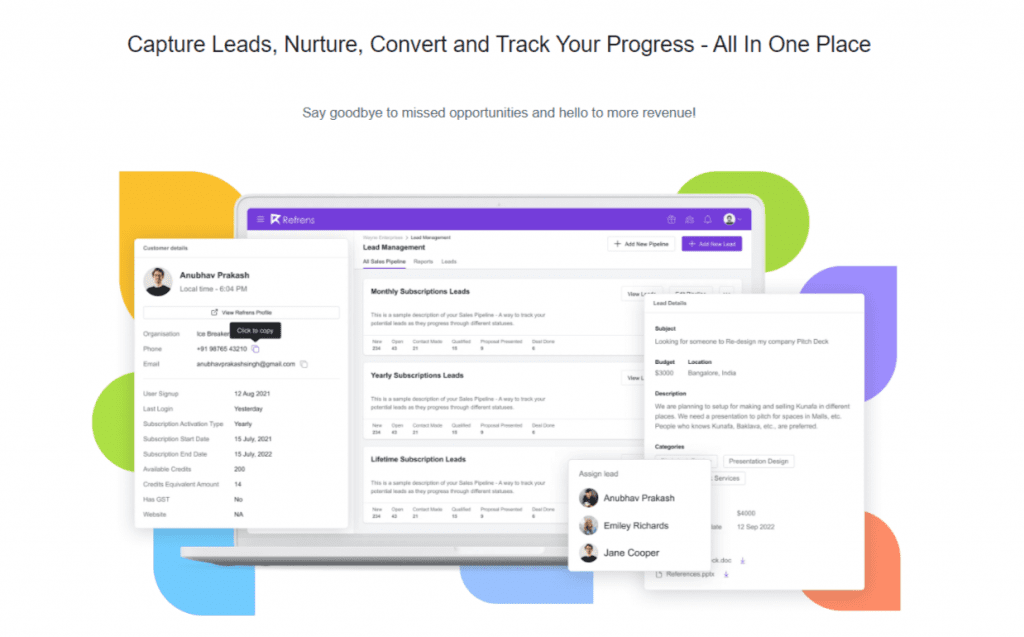
Major features
- Automatically capture leads from your website, social media, and other platforms directly in your lead management system with lead capture forms.
- Communicate with leads over WhatsApp and Email, and keep track of all the communication in one place.
- Create & send quotations, invoices, and all types of accounting documents.
- Manage leads for multiple products & services in different pipelines.
- Track the performance of your sales team with the daily tracker and pipeline reports.
2. HubSpot CRM
HubSpot is another great software that is growing in popularity but is a bit expensive.
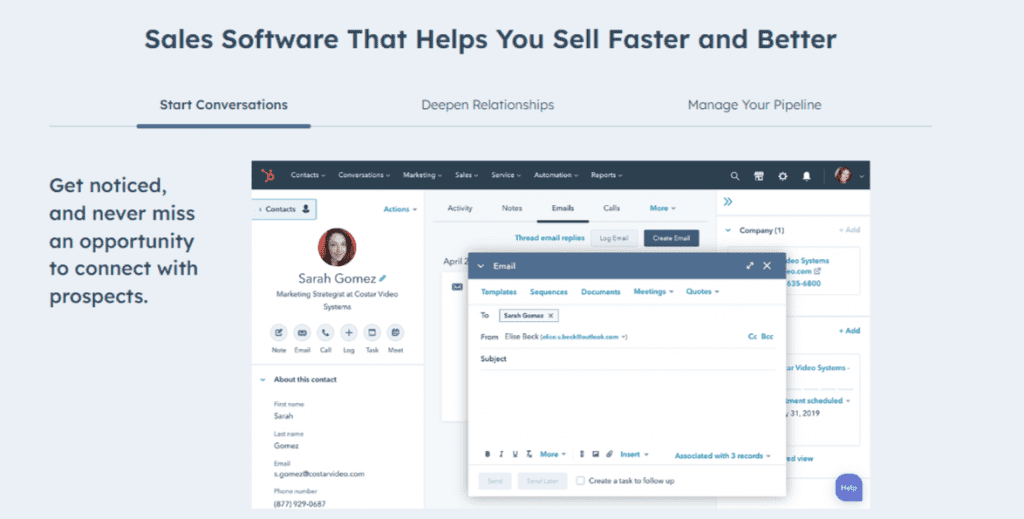
Major features
- Lead scoring mechanism to help you prioritize leads.
- Contact activity tracker tools to track the activity of your site visitors.
- Create & send quotes and proposals and capture digital signatures
- Create automated email campaigns for lead segments
3. Agile CRM
Agile CRM is a comprehensive system that helps you with sales, marketing, and customer service activities.
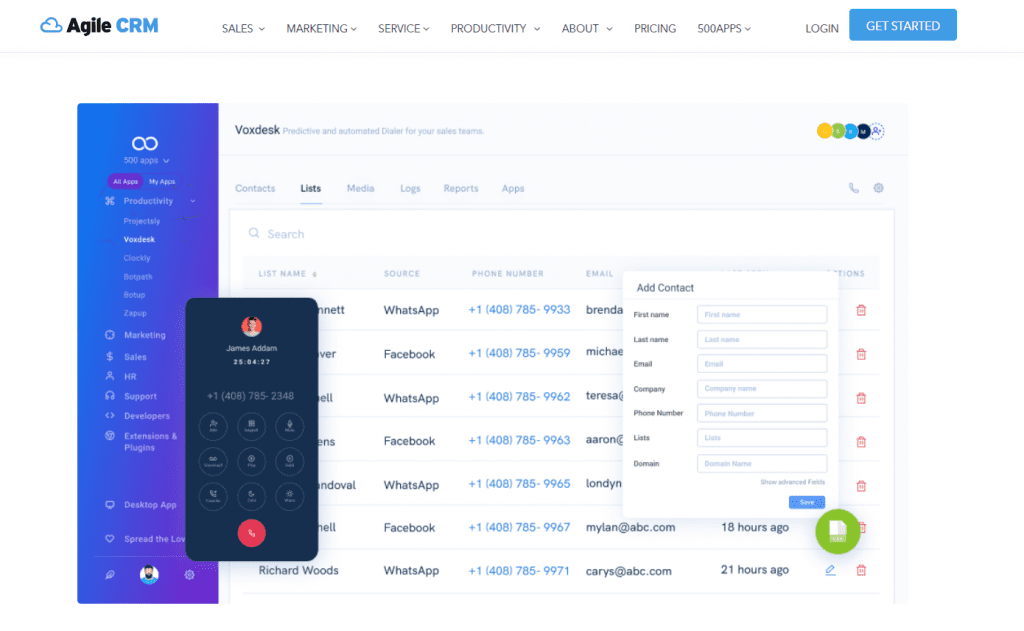
Major features
- Web forms to capture leads from your website
- Lead scoring mechanism to prioritize leads
- Communicate with leads over calls and emails
- Manage documents, create tasks, and schedule meetings
4. Bitrix24
Bitrix24 is an all-in-one software that not only helps you manage leads but also helps you create websites, and manage HR, Marketing, and CRM among other things.
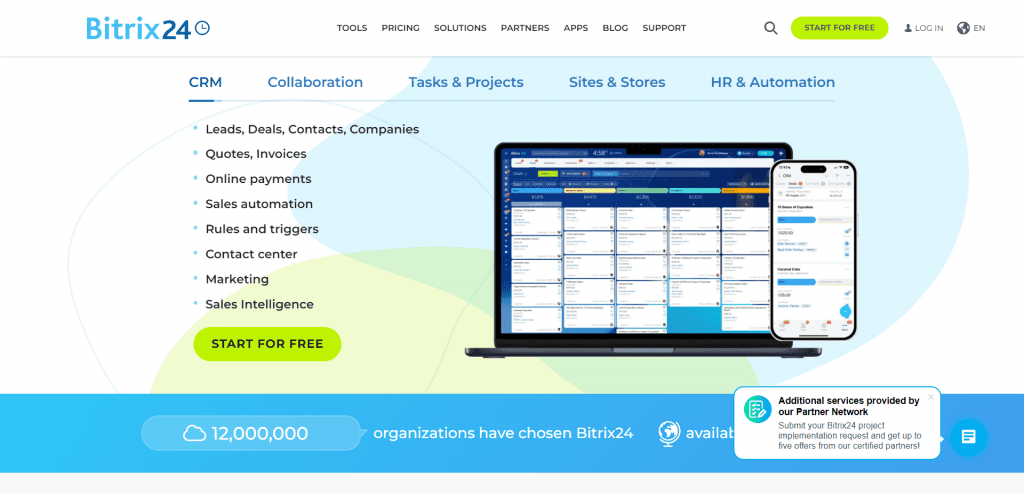
Major features
- Generate landing pages
- Create web forms & widgets
- Built-in telephone, video call, chat, and email tools
- Create quotations & invoices
- Complete overviews of lead/client data
5. Pipedrive
Pipedrive is an easy-to-use sales-focused CRM system that helps you track, engage, and manage leads effectively.
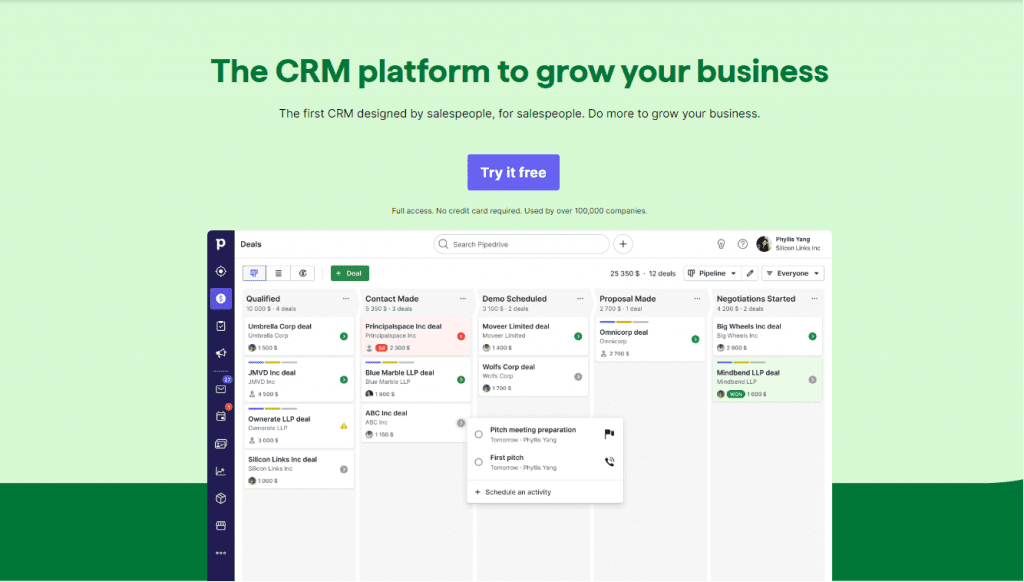
Major features
- Smart contact data to automatically update lead information from online resources
- Smart docs feature to auto-populate lead data in quotes, proposals, and other documents
- Run email campaigns
- Schedule meetings
Although we have listed some of the best software here, You need to consider various factors to find an LMS that meets your unique business needs. You can check out our article on the factors you need to consider if you need help.
Best real estate lead management software for realtors
Leads are the lifeblood of any business; and for a highly competitive industry like real estate, it’s important to have lead management software that can give you an edge in terms of efficiency.
You can combine this software with forging relationships with trusted lead generation companies in order to root out the juiciest prospects while avoiding the legwork and administrative hassle involved in traditional techniques. When so much is on the table with each deal, getting every advantage you can is a must.
Unlike other businesses, the real estate industry comes with its own unique requirements, let’s see why.
- Complex processes
The sales process requires multiple stakeholders and a longer sales cycle. This requires software that can manage this complexity and also enable users to track the complete sales cycle efficiently
- Mobile functionality
Most real estate agents stay busy with client meetings and property visits. Having mobile functionality can come in handy here.
- Communication personalization
In real estate, relationship building is extremely important. This requires an LMS that can help the agents send personalized communication and follow-up messages in a timely manner.
- Integration
Real estate businesses get leads from multiple platforms. Also, they use multiple tools & software for daily business operations. An LMS that integrates well with the major platforms & tools can help streamline your workflow and reduce the duplication of data entry.
- Data volume
Real estate businesses have to deal with a large volume of data. This includes buyer/seller information, property information, transaction history, and more. This requires the LMS to efficiently store, organize, track, and manage all this data.
We researched through different LMS to find out the ones that are better suitable for your real estate business. Here are the top 5 you should consider:
1. Wise Agent
Wise Agent is an all-in-one lead management/CRM software that is specially designed for real estate brokers and agents.
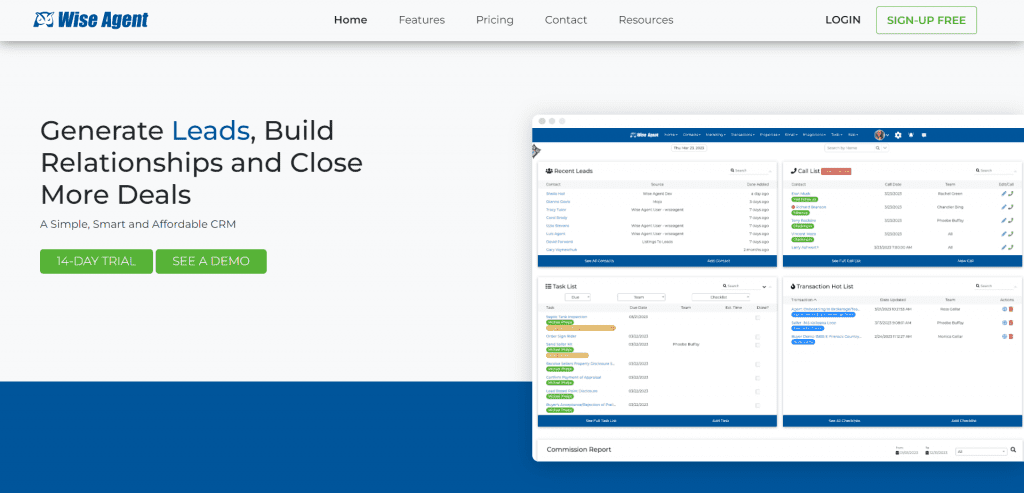
Looking to become a UX designer and start your career off on the right foot? Our blog has got you covered with all the information you need to get started!
Pricing: Starting at $39/Month
Top features: Transaction management, lead automation, marketing automation, commission reports, 3rd party integrations, 24/7 live support
2. Propertybase
Built on the Salesforce platform, Propertybase is a leading end-to-end CRM that you can customize from the code level.
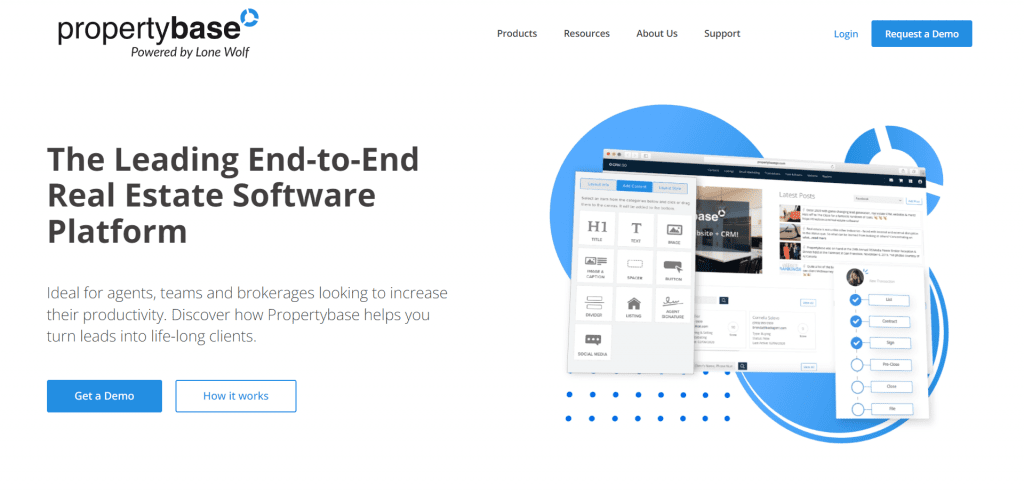
Pricing: Not listed – custom pricing
Top features: Marketing automation, powerful customization, listings management, reverse prospecting, website builder, and more
3. Realvolve
Realvolve is a real estate CRM with automated workflows.
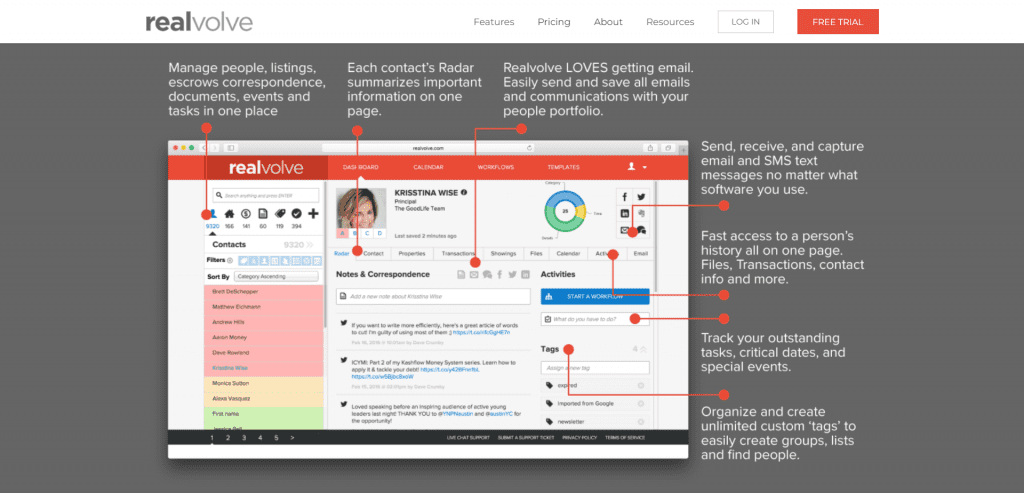
Pricing: Starts from $94/month
Top features: Customized workflow, contact management, transaction management, ready-to-use templates, and more.
4. Top Producer
is a leading CRM software specifically designed for the needs of real estate agents.
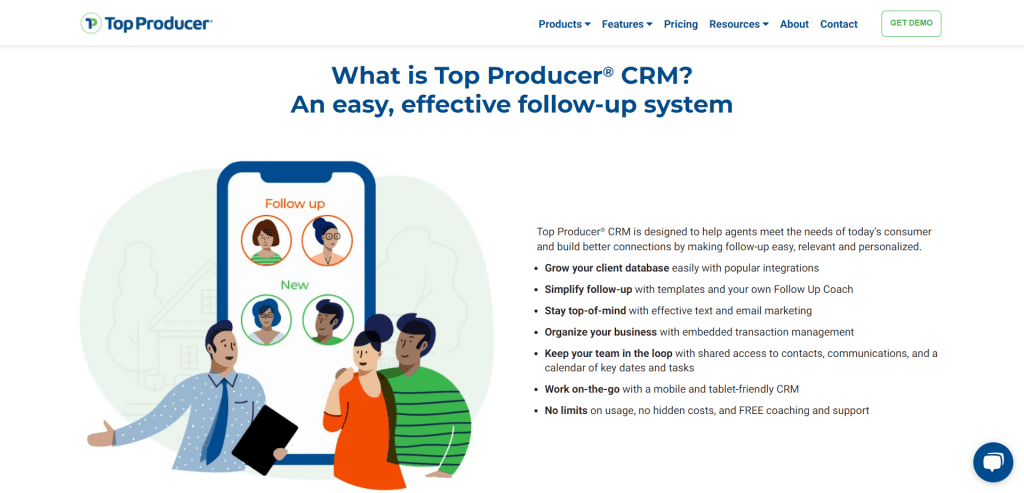
Pricing: Starting from $109/month
Top features: Predictive farming, automated lead response, transaction management, and more.
5. Follow Up Boss
Follow Up Boss is an all-in-one lead management software for real estate and has been an industry leader for quite some time.

Pricing: Starting from $69/month
Major features: Automated lead follow-up, drip email campaigns, call reporting, and more.
Best lead management software for insurance agents
Insurance is a highly competitive industry, and insurance agents need to find and convert leads quickly to stay ahead of their competitors.
A lead management system can help them efficiently manage their leads and automate lead nurturing processes, so they can focus on building relationships and closing deals.
The requirements of insurance agents are significantly different from other businesses due to the nature of their industry.
For example, insurance agents may need to manage a large volume of leads, have unique data privacy and security requirements, and comply with industry-specific regulations.
Additionally, insurance agents often work with a diverse range of customers with different needs and preferences, so they may require more sophisticated lead nurturing and engagement tools to effectively convert leads into customers.
Let’s see the top 5 LMS that can meet the unique needs of insurance agents.
1. Radiusbob
Radiusbob is specifically built for the Insurance industry, so is simple and easy to use.
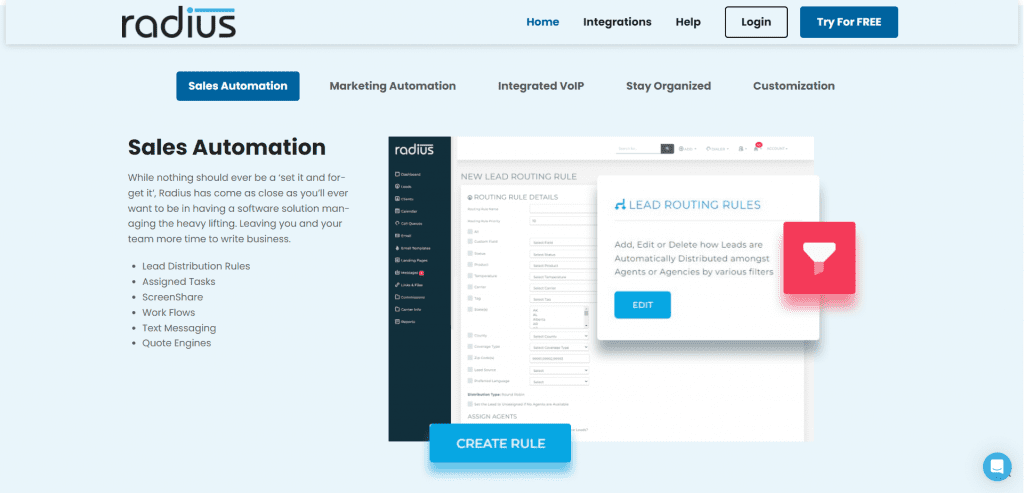
Pricing: Starts from $78/month
Major features: lead distribution, automated workflows, email marketing, telephony system, and more.
2. AgencyBloc
Agency Bloc is the best CRM for health and life insurance agents.
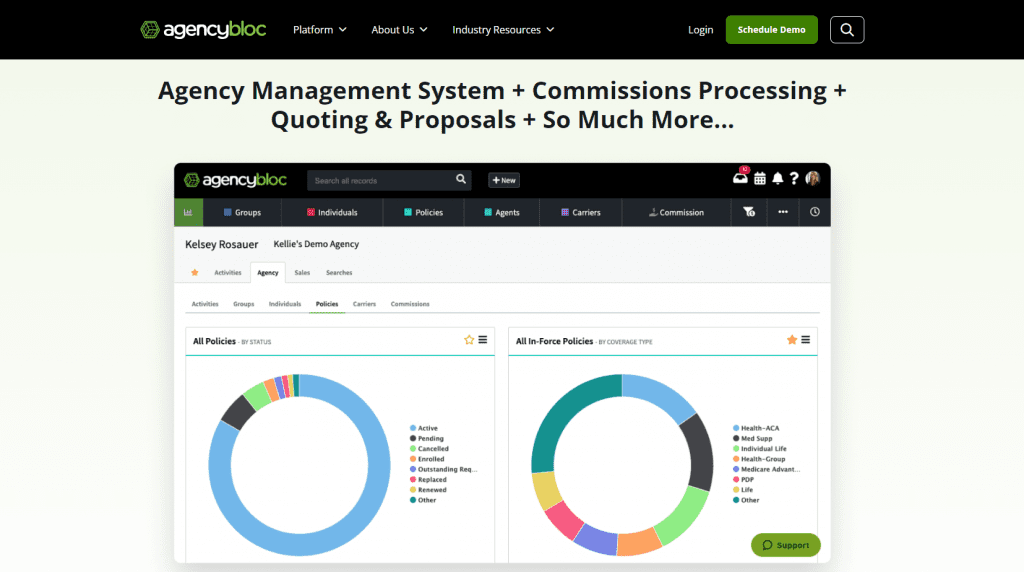
Pricing: Starts from $75/month
Major features: Contact management, activity tracking, email marketing, document management, commission processing, and more.
3. Insureio
Insureio was among the first software solutions built specifically for the insurance industry.
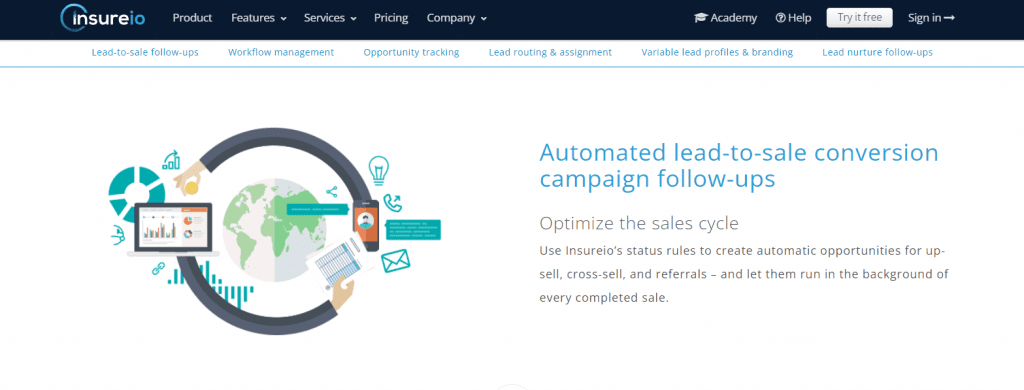
Pricing: starting from $25/month
Major features: Lead generation, contact management, marketing automation, email marketing, quote generation, underwriting tools, electronic application, and e-policy delivery,
4. NextAgency
NextAgency is an Insurance agency management system with CRM, marketing, and commission tools.
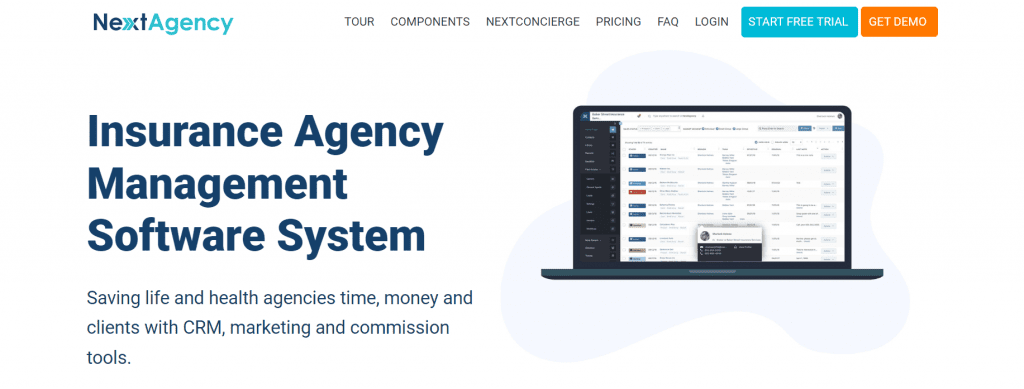
Pricing: Starts at $57/month
Major features: Commission management, campaign management, automated followups, 3rd party integrations, and more.
5. Applied Epic
Applied Epic is an insurance agency management software with the capabilities to manage your complete business operations with the flexibility to grow as you do.
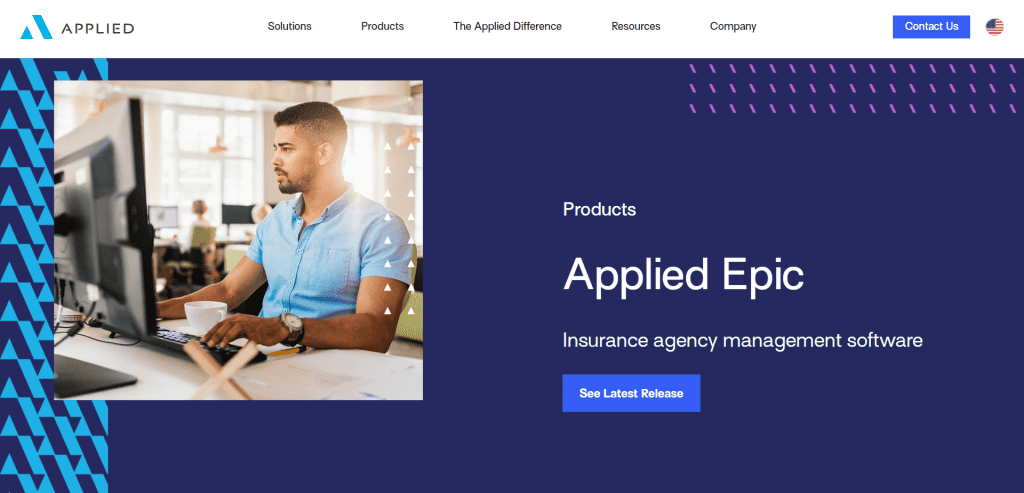
Pricing: Custom pricing
Major features: Sales automation, P&C benefits management, omnichannel customer service, Insurer connectivity, document management, and more.
6. TeleCRM
TeleCRM Is India’s Simplest Insurance CRM with sales and lead management, workflow automation, and document management.
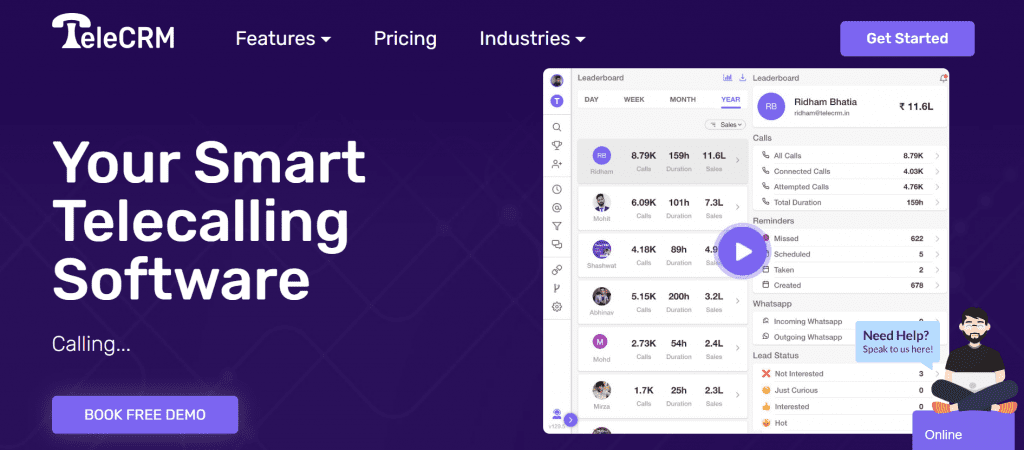
Pricing: Starts at $19/ per user per month
Major features: Contact management, Custom lead fields, Documents management, Follow-up reminders, WhatsApp Reminders, WhatsApp Broadcast, Application capture, 1-click WhatsApp/Msg.
7. Shape
Shape Software is an all-in-one CRM for the insurance industry. It offers a comprehensive suite of features to insurance agencies to enhance efficiency and effectiveness.
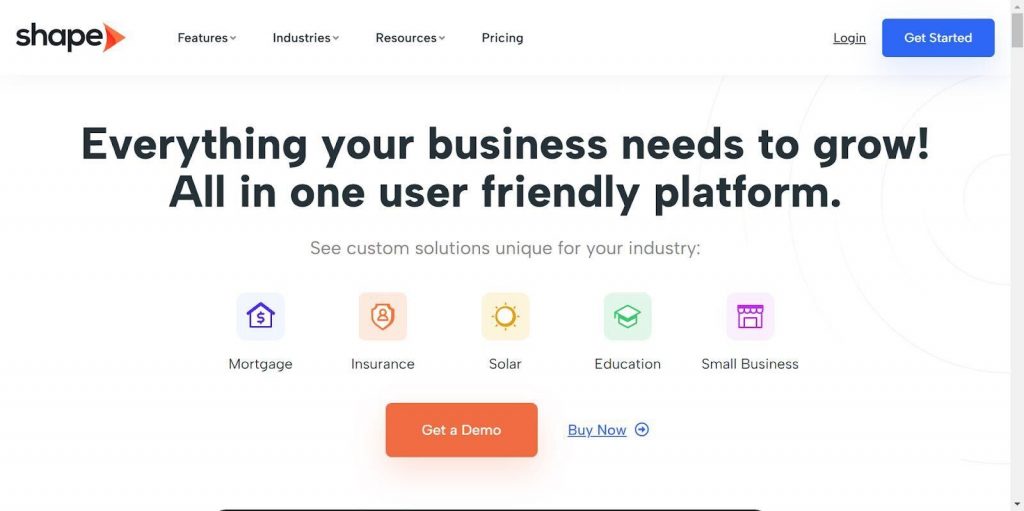
Pricing: Starts from $47/month
Major features: Real-time portfolio integration, Client goal tracking, Integration with major platforms, Secure portal and more.
Best lead management software for freelancers and agencies
Most freelancers and small agencies manage their leads in a spreadsheet only. There are primarily three reasons for that – 1) They don’t have to manage many leads in the first place 2) Limited budget, and 3) Spreadsheets don’t require any technical knowledge, are easy to use, and are something that they are already familiar with.
Keeping these factors in mind, there are several lead management software that caters to the unique needs of freelancers. Let’s take a look!
1. Refrens ABC
Refrens ABC is the most comprehensive business operating system for freelancers and agencies. From capturing leads to collecting payments – it does all in a single software.
Pricing: Basic plan is free, Premium starts at $6/month
Major Features:
- Web forms to automate lead capture from your website, social media, and any other platforms.
- Create & send quotations, invoices, and other accounting documents
- Communicate with leads over WhatsApp and Email
- Auto reminders to never miss a follow-up
- Create multiple pipelines for different products & services
- Assign leads to team members, and track their progress
- Also get access to Refrens accounting, client management, expense management, inventory management, profiles & networking system
2. HoneyBook
HoneyBook is an all-in-one software for freelancers from tracking leads to collecting payments.
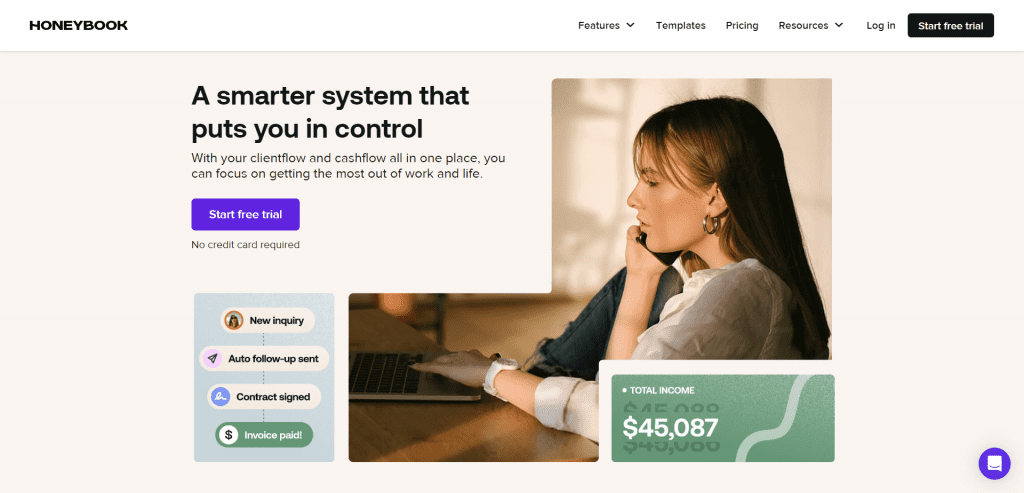
Pricing: $39/month
Major features: Lead & project tracking, creating contacts & proposals, scheduling meetings, collecting payments, and more.
3. Flowlu
Flowlu is also an end-to-end solution for freelancers to manage their business operations in one place.
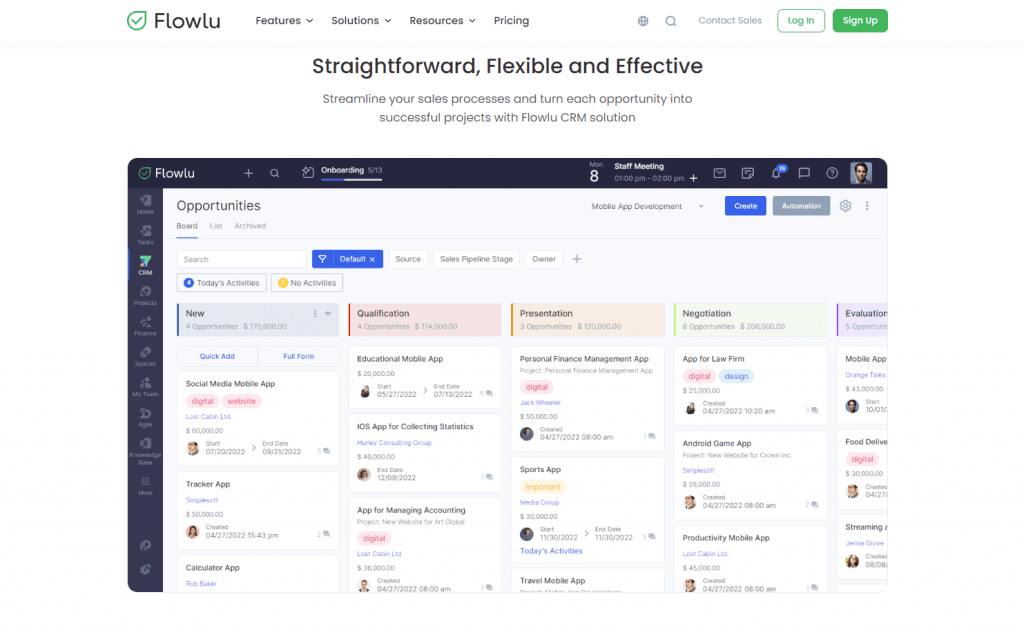
Pricing: Basic plan is free, and paid plans start at $29/month
Major features: Lead & project tracking, creating contacts & proposals, scheduling meetings, collecting payments, and more.
4. Funnel CRM
If you are just looking for a stand-alone CRM system, Funnel CRM might be a good choice for you.
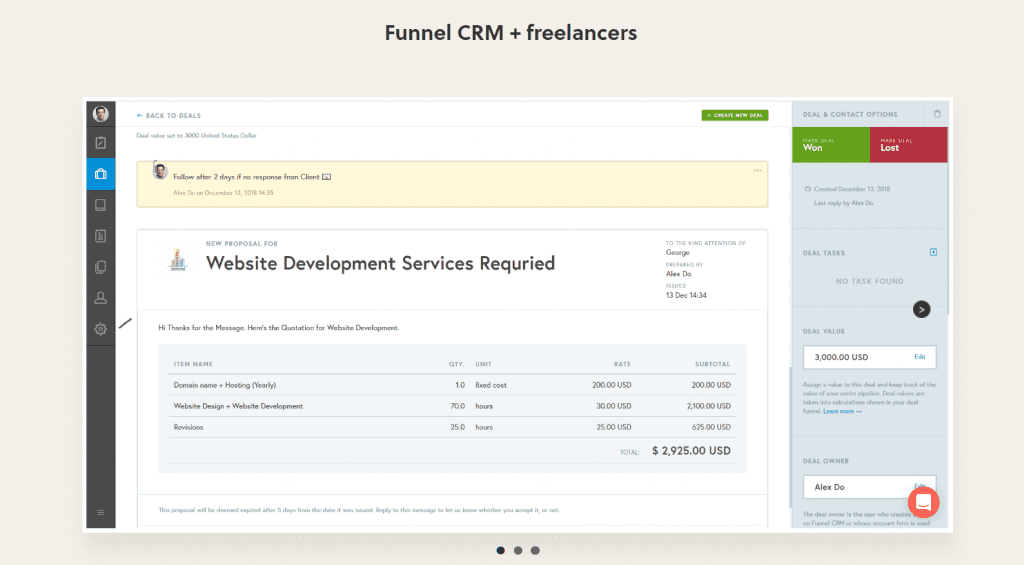
Pricing: Starts at $10/month
Major features: Contact forms, contact management, client integration, creating proposals, managing tasks & activities, creating notes, and more.
5. MyBizHive
MyBizHive is a complete CRM solution for freelancers to manage their business operations in one place.

Pricing: Basic plan is free, and paid plans start at $18/month
Major features: Manage contacts & leads, manage bookings, send quotations & invoices, collect payments, and more.
Best lead management software for call center
Call center CRM systems not only provide contact and lead management features but also have functionalities like in-built dialers, call routing, call scripting, call recording, calling reports & analytics, interactive voice response, etc.
We have curated the list of the top CRM and leads management software for a call center business to help you find the right one for your business.
1. Agile CRM
Agile CRM offers powerful CRM automation tools for small and medium businesses.

Pricing: Basic plan is free, and paid plans start at $9/month
Major features: Inbound & outbound calls; call routing, recording, and scripting; call notes, call reports, advanced telephony integrations, and more.
2. EngageBay
EngageBay is an all-in-one CRM software with features that support the needs of a call center business.
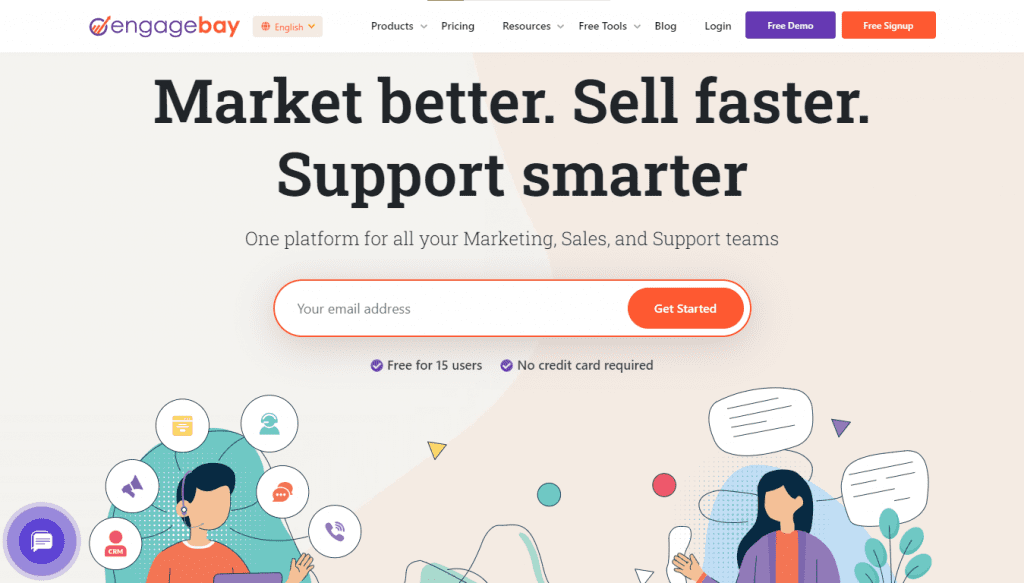
Pricing: Basic plan is free, and paid plans start at $11/month
Major Features: Automated dialing, call recording, workflow automation, smart follow-ups and reminders, reports & analysis, 3rd party integrations, and more.
3. Nextiva
Nextiva offers comprehensive business communication tools with chat, business phone services, video, and collaboration functions in a single app.
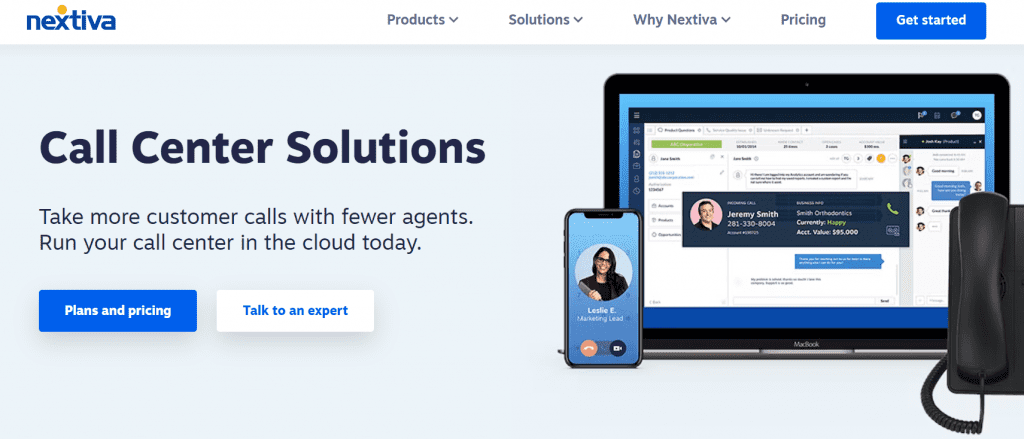
Pricing: Starting from $18/month
Major Features: Calling, recording, conferencing, transcriptions, 3rd party integrations, workflow automation, quality management, intelligent virtual agent, and more.
4. Freshsales
Freshsales offers robust customer and leads management tools with call features at affordable prices.
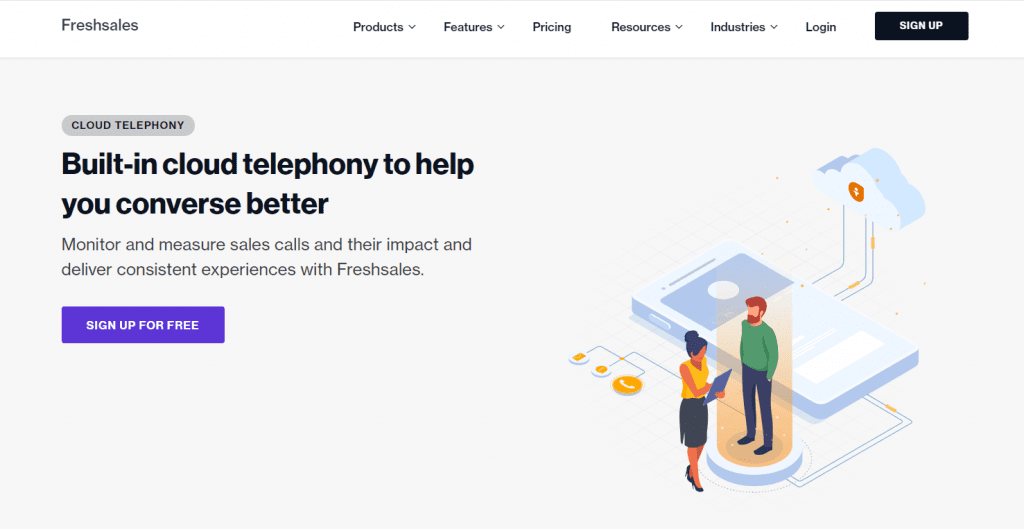
Pricing: Starting from $15/month
Major Features: Contact, account, and deal management; workflow automation; record & mask calls; phone, email, WhatsApp, and chat functionality, AI assistant, and more.
5. Zoho CRM
Zoho CRM is a comprehensive platform to manage leads and customer relations. While it comes with some built-in calling features, you can integrate it with Zoho voice or other 3rd party tools for advanced functionalities.
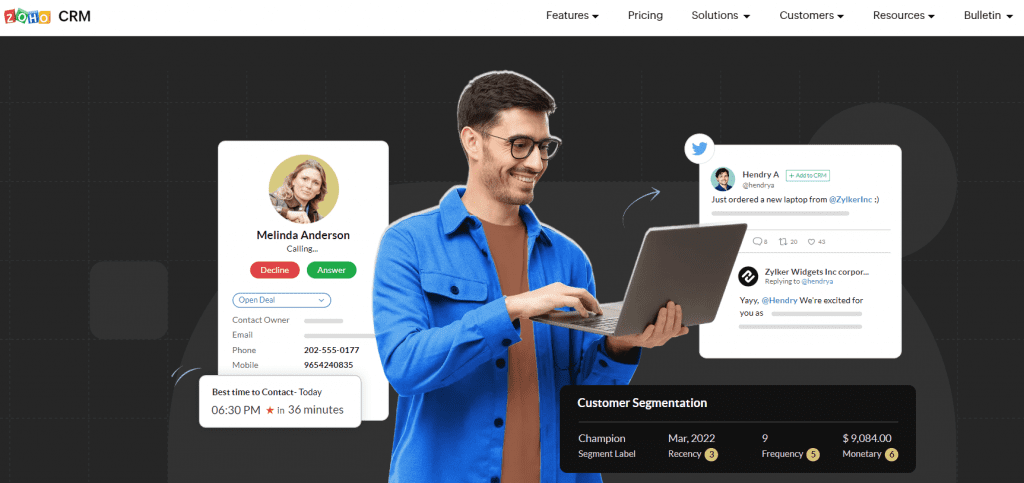
Pricing: Starts from $12/month
Major Features: In-built telephony, call notes, call reporting, call reminders, auto logging, follow-up tasks, tracking & monitoring, multi-vendor support, call analytics, and more.
To conclude, no lead management or sales CRM system is universal. The ideal system for your business would differ according to the industry you operate in and your unique business requirements.
There are several factors you need to consider, So do your thorough research before paying for any software to ensure that you are not wasting your resources.
How to Track and Manage Leads with Excel or Google Spreadsheets?
If you are a small business with limited resources, and can’t afford a stand-alone lead management system, Excel or Google spreadsheets can be your savior.
In this article, we will look at all the details you would need to keep track of in your spreadsheet to effectively manage your leads.
Firstly let’s see what data you need to capture.
- Lead contact details
- Company Name
- Contact Person
- Email Address
- Phone
- Mailing Address
- Lead Requirements
- Requirements
- Budget
- Lead Activity Tracking
- Who created the Lead?
- When was the lead created?
- To Whom it is assigned?
- When it was last contacted?
- What are the next action steps?
- When is the next follow-up date?
- What is the status of the lead? (open, won, lost, not serviceable, etc)
- Internal Notes or Comments
- Lead Scoring
- You can also include formulas to score leads on certain parameters like lead status, ability or willingness to buy, demographics, etc. This scoring can help your sales team prioritize and organize leads effectively.
- Analysis
- You can also create reports, charts, or graphs to visualize & analyze the effectiveness of your lead management process.
If you are short of time, you can use our full-fledged lead management system or if just want a simple spreadsheet, you can use this free sales lead tracking and lead management template, to quickly get started.
Once you have found the software that works for your business, you need to set it up effectively to get the most out of it.
Also Read: Lead Generation: Guide to generate leads for Beginners
7 Steps to Effectively Set up a Lead Management Software
LMS can be a powerful tool for any business, as it allows you to capture, track, and manage potential customers efficiently. However, setting up lead management software can be challenging, especially if you are new to using these platforms.
It took me weeks to find the right system that worked for my business, and I don’t want you to make the same mistakes that I did.
And that’s why I am sharing this simple step-by-step guide to effectively setting up a lead management system that helps you bring efficiency to your sales process, and convert more leads into sales.
1. Identify your business goals and objectives: The first thing you need to do is to understand your existing sales process step-by-step, see all the bottlenecks in your current process, and where you need help. This will determine the features and capabilities you would need in an ideal LMS for your business.
2. Research: Research and compare different lead management software out there. Look for the one that can replicate your existing process digitally, make it more efficient, and fit into your budget.
For example, I was getting leads from multiple platforms and had to add all this data manually to a spreadsheet.
So, I needed an LMS that could automatically fetch lead data from all these platforms. And that’s one of the reasons why I went ahead with Refrens which provides web forms that can automatically capture data from anywhere to my LMS.
Also, I no longer have to pay for multiple tools as I can use Refrens to create invoices and collect international payments as well.
3. Setting up: Once you get the LMS that works for you, start setting it up by
- Getting an onboarding demo & training if required
- Adding your team members, and managing their access levels.
- Importing your existing leads data
4. Customize: Create and customize your lead management system to reflect your business processes and workflow. For example, Refrens enabled me to create multiple sales pipelines for different products and services and customize things like lead stages, pipeline fields, tags, etc.
5. Integrate & Automate: Integrate your LMS with other tools and platforms if required. For example, I embedded Refrens’ web forms on my website, social media, and other platforms where I was getting my leads. Any lead I collect via these forms automatically reflects in my LMS.
6. Track & Analyze: Keep frequent checks on your lead flow to monitor how leads are moving through your sales pipeline, keep track of all the communication in one place, and strategize to quickly move your leads through the sales process and improve lead conversion.
7. Review & Update: Regularly review your LMS and see if you need to make any changes to meet your business goals. Stay updated with the latest features and best practices to get the most out of your LMS.
Also Read: Top Softwares to Manage your Business


